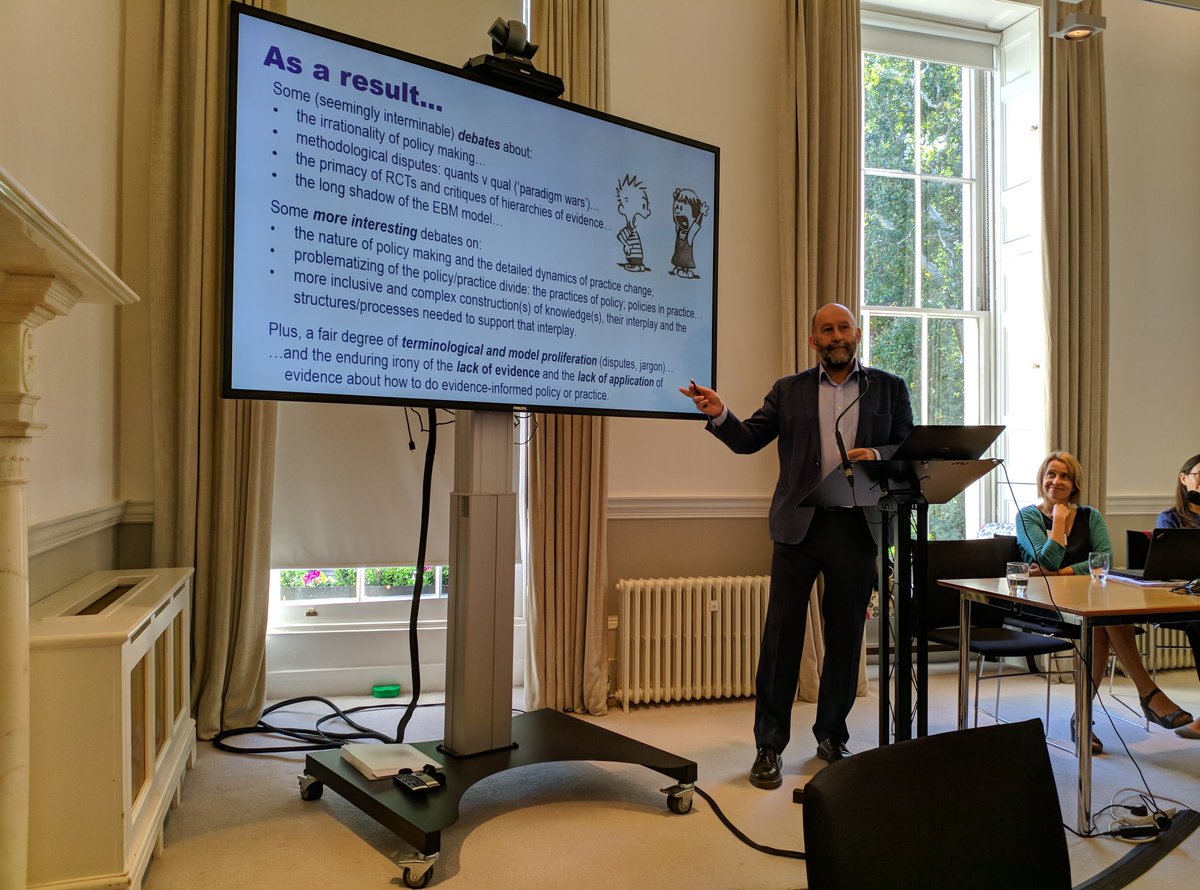.@AnnetteBoaz and @oliver_kathryn introduce #transformure: UK not as good as we think we are at evidence-informed policy; lots of current research, policy and practice interest; need to think beyond barriers and facilitators to evidence use. 

Huw Davies tracks the history of evidence-informed policy in the UK from 'what counts is what works' forward. A field that has initiated interesting debate, but (ironically) tended through time towards introspection? #transformure 

A plug from Huw for forthcoming update to the classic 'What works?' - to be released by Policy Press early 2019. A critical but supportive reflection on how evidence can inform policy, inc chapter by me & @OliWilliamsPhD on evidence-informed public service delivery. #transformure 

Interesting social network analysis from @oliver_kathryn on how people in the room from various disciplinary backgrounds connect with each other. Important overlaps, but a small number of more central nodes hold us together. #transformure 

... But the literatures we draw on are more disjointed. Similar questions bring answered in isolation? #transformure 

Nick Mays: policymakers tend not to want researchers to make policy recommendations. Research evidence is 1 consideration among many for policymakers, & researchers aren't privy to full range of considerations and tradeoffs that those in policy positions must make. #transformURE
(It may be heresy to say this, but I have a lot of sympathy for this position. Policy is, and should be, political. It should be subject to popular control, one way or another. I may be a scientist, but I don't want to live in a scientocracy. #transformure)
.@Sarah_A_Hartley on the politics of coproduction and co-development in international science collaborations: tech transfer a priority for the global North; capacity development more important to the South #transformure 

(As a self-indulgent aside, this piece from a few years ago shows that very similar power relationships can also infuse public involvement in economically developed world countries: sciencedirect.com/science/articl…) #transformure
Interesting debate now about whether #ref2021 drives claims of impact towards individualistic reliance on 1ry research studies: devaluation of evidence synthesis? Or do savvy institutions recognise that impact arises from cumulative influence of research programmes? #transformure
My sense on this is that it may be v discipline-specific. Biosciences #ref2021 panel has indicated that it wants demonstrable population impact (not just 'policy influence'), wants to see new impacts not continued ones, and does not value individual testimony. #transformURE ...
... Does this risk fetishizing the new and exciting, rather than recognising that academic research's real value to society burns more slowly (and is as much about consolidating and correcting as it is about discovering)? #ref2021 #transformure
Building on the #ref2021 debate, Ian Viney of the MRC reflects on some of the unintended consequences of measuring (and incentivsing) research impact. #transformure 

.@kieran_walshe asks whether some areas of public services might receive more research funding than they merit - diplomatic answer from the panel is that it's a legitimate question that UKRI will have to grapple with #transformure
Rounding off the #transformure day, @VivianT88 discusses @wtgrantfdn's approach to researching research use and acting on findings. Theory-driven approaches and rich empirical evidence central to their programme. 

And building a learning community from the groups that have contributed to this research agenda, spanning disciplines (and connecting with other funders and networks internationally) and helping to identify complementary insights as well as divergences. #transformure
#transformure day two. Brian Head begins by suggesting that measuring research impact/uptake might be more defensible where the evidence is technical, specific and prescriptive, and so fidelity might be a reasonable proxy for influence. 

.@justinparkhurst examines disciplinary perspectives that might help us to understand the social process of evidence use, including e.g. cognitive psychology and heuristics #transformure 

We can move from this towards a normative framework for research utilisation, starting to distinguish between good and bad forms of evidence use. #transformure 

.@CairneyPaul presents on his work with @oliver_kathryn on how academics can achieve policy influence: less to do with the skills of the individual 'policy entrepreneur'; more about the environment and connections they gain access to. #transformure
And as the full paper (paulcairney.files.wordpress.com/2018/09/cairne…) by @CairneyPaul and @oliver_kathryn makes clear, this often reflects structural inequalities within academia in terms of who has the social and cultural capital to influence. #transformure 

• • •
Missing some Tweet in this thread? You can try to
force a refresh






